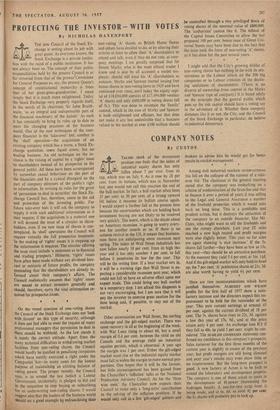PROTECTING THE INVESTOR- WITH VOTES
By NICHOLAS DAVENPORT
THE new Council of the Stock Ex- change is setting about its job with great gusto. As everyone knows, the Stock Exchange is a private institu- tion with the mind of a public institution. It has not always been so. The concept of their public responsibilities held by the present Council is as far removed from that of the prewariCommittee for General Purposes as, say, the present Queen's concept of constitutional monarchy is from that of her great-great-grandmother. I mean simply that it is much more enlightened. Today the Stock Exchange very properly regards itself, in the words of its chairman, Sir John Braith- waite, 'as an integral and indispensable part of the financial machinery of the nation.' As such it has constantly.to bring its rules up to date to meet the changing practices of the business world. One of the new techniques of the com- pany financier is the lake-over' bid; another is the 'shell' operation—the acquisition of an existing company which has a name, a Stock Ex- change quotation, some liquid assets, but no trading business. An old technique on the in- crease is the raising of capital by a 'rights' issue to shareholders instead of by prospectus to the general public. All these have been accompanied by somewhat casual behaviour on the part of the financiers and by a cynical disregard on the part of company directors of the public's right to information. In revising its rules for the grant of 'permission to deal in securities' the Stock Ex- change Council has, therefore, come to the aid and protection of the investing public. For future take-over bids it will ask the company to supply it with such additional information as it may require; if the acquisition is a material one it will demand the issue of a circular to share- holders, even if no new issue of shares is con- templated. In 'shell' operations the Council will require virtually the full prospectus treatment. In the making of 'rights' issues it is stepping up the information it requires. The circular offering the issue must include 'a statement as to financial and trading prospects.' Hitherto, 'rights' issues have often been, made without any dividend fore- cast or estimate of future profits, the company pretending that the shareholders are already in- formed about their company's affairs. The Council realistically assumes that 'rights' issues are meant to attract investors generally and should, therefore, carry the vital information re-
quired for prospectus issues. •
On the vexed question of non-voting shares the Council of the Stock Exchange does not 'look with favour' on this type of security, although it does not feel able to meet the request of many professional managers that permission to deal in them should be withheld. As the law stands it is surely the correct attitude. Apart from the many technical difficulties in withdrawing market facilities from non-voting shares, the Council would hardly be justified in penalising companies which have merely exercised a right under the Companies Act—in many cases for the honest Purpose of maintaining an existing balance of voting power. The proper remedy, the Council says, is to amend the law (which a Labour Government, incidentally, is pledged to do) and in the meantime to stop buying or subscribing for or underwriting non-voting shares. I would suggest also that the leaders of the business world should set a good example by enfranchising their
non-voting 'A' shares, as British Home Stores and others have decided to do, or by altering their articles at least to allow their 'A' shareholders to attend and talk, even if they do not vote, at com- pany meetings. I am greatly surprised that Sir Simon Marks, who is the most ethical trader I know and is also by all accounts a model em- ployer, should still treat his 'A' shareholders as outcasts. Marks and Spencer started issuing free bonus shares in non-voting form in 1929 and have continued ever since, until today the equity capi- tal of £18,094,000 consists of £17,494,000 voteless 'A' shares and only £600,000 in voting shares (all of 5s.). This was done to maintain the 'family' control, which in the case of Marks and Spencer is both enlightened and efficient, but that does not make it any less undesirable that a business valued in the market at over £100 million should be controlled through a tiny privileged block of voting shares of the nominal value of £600,000. The 'authorities' cannot like it. The refusal of the Capital Issues Committee to allow the last proposed 100 per cent, bonus issue of Great Uni- versal Stores may have been due to the fact that the issue took the form of non-voting 'A' shares, as it has done for the past several years.
* I might add that the City's growing dislike of non-voting shares has nothing to do with its sen- sitiveness to the Labour attack on the 500 big companies or to Labour criticism of the declin- ing usefulness of shareholders. (There is no divorce of ownership from control in the Marks and Spencer type of company.) It is based solely on the principle that the general public which puts up the risk capital should have a voting say in the adventure of it. Whether these company dictators like it or not, the City, and the Council of the Stock Exchange in particular, do believe in industrial democracy.






























 Previous page
Previous page